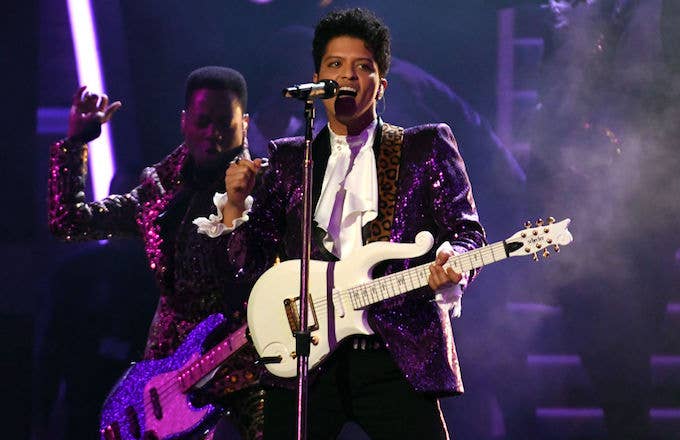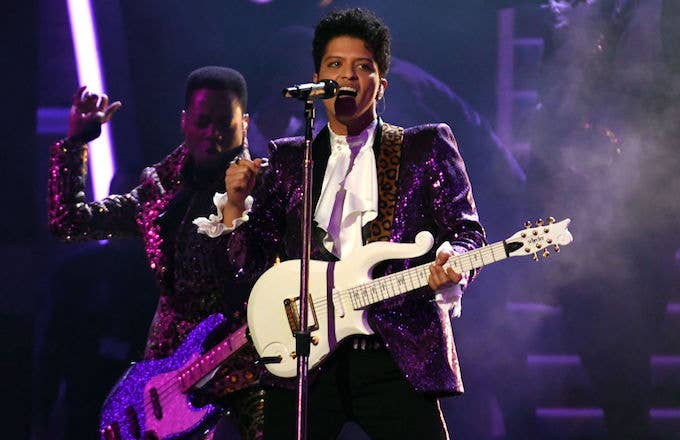
By now, you’ve heard the internet’s tectonic plates shifting again. This week, the fault line is Bruno Mars. On one side of the divide, you have people asserting that Bruno Mars is, as a non-black performer excelling at creating traditionally black art, a cultural appropriator. On the other side—a side that seems much bigger today—are Bruno supporters who believe he’s done no wrong.
Depending on how you squint your eyes, they’re both right. This isn’t a cut and dry issue, there’s a Venn Diagram here mixing up those who think it’s clear-cut appropriation, those who wonder why we can’t just let Bruno live, and the very tangled overlap in the middle which concedes that both camps make some good points.
Nobody wants anyone to come for their fave, no matter how tangential. I get it. But this discussion constantly lingers in the background of our consciences like a boogeyman, drifting forward incrementally every time a non-black artist dominates in the black space (read: often). Bringing this conversation forth comes with a cost. Let the internet tell it, Bruno is being targeted by a mob of angry black haters. Seren Sensei, the outspoken writer/YouTuber/activist/artist who made her opinion of Bruno Mars explicitly clear in the viral clip shared online last week, was faced with a 7-day suspension from Twitter when Bruno Mars’ stans reported her en masse in retaliation.
this is why i hate bruno mars @seren_sensei says it all pic.twitter.com/CRLktsA2ea
Seren Sensei is being penalized for pointing out a very real thing that’s wrong with the industry and the Recording Academy today: "The issue is we want our black culture from non-black bodies," she says in the clip. It’s hard to argue against her when you look at the history books.
The most popular name in music associated with appropriation is Elvis Presley, a man who eventually became the King of Rock and Roll. Presley was discovered by record producer and industry visionary Sam Phillips in the mid-1950s. According to TIME, Phillips said the following just before crossing paths with Elvis: "If I could find a white man who had the Negro sound and the Negro feel, I could make a billion dollars." He may not have made a cool billion dollars off of Elvis in the end, but it was a billion-dollar idea that proved to be a winning ticket for executives that followed him. Presley sang a watered down version of black blues and it worked tremendously well commercially, providing a blueprint for popular music that we’re still seeing used now.
In some ways, Bruno Mars is the perfect case study for cultural appropriation in the here and now, simply because he makes the conversation more messy and complicated.
For examples that this is still going on today, look no further than the top 10 of the current Billboard Hot Rap Songs chart. Three out of 10 slots are occupied by Post Malone, a white artist who, despite making rap music, has gone out of his way to publicly distance himself from the genre—yet here he is, present and accounted for. Another three slots are taken by NF and G-Eazy, who are also white, and 6ix9ine, who is Mexican and Puerto Rican. The latter is the most polarizing but perhaps the most culturally synonymous, as the pivotal movements aligned with hip-hop—break dancing, DJing, and graffitiing—were pioneered by blacks and Latinos working together in the streets of New York. (6ix9ine also uses the n-word like his life depends on it, but that’s a conversation for a whooole other day.)
We’ve made progress, in a way: instead of a black/white conversation, we’re now being inclusive with our shade. Artists like the outwardly harmless Bruno are discovering that people of color can get this work, too. This is where things get uncomfortable. No self-respecting person of color wants to bring another POC down, but the point still stands: Bruno isn’t black, but makes black-indebted music, and has profited handsomely for it. However, let’s say Bruno was the exact same figure, with the exact same style and team—but white. He would likely have way more success (let’s be real), and this cultural appropriation debate would have happened long ago. It would be tired by this point, like the current conversation is, but it would be tired because black people would have come to the conclusion that he was an offender by now. Justin Timberlake, a known... appreciator of black music, escaped the wrath of the internet just before suspicions of appropriation became a mainstream cultural concern. We all see it now: he’s already being escorted out of the paint, after re-routing to pop-country land and leaving behind fans of color who loved his hip-pop/R&B.
In some ways, Bruno Mars is the perfect case study for cultural appropriation in the here and now, simply because he makes the conversation more messy and complicated. He might be the hardest working man in show business. He pumps out music like he’s running out of time. He sets every stage on fire that he ever touches and pays homage as often as he can to the music he’s recreating (the man got Babyface a Grammy this year, after all). There are worse examples of cultural appropriators, but that doesn’t mean he should get an automatic pass.
The machinations that took Bruno to the top of the charts—literally: as I write, Bruno Mars just passed Usher for most No. 1 Billboard Radio Songs among males—are just as real as his work ethic. Bruno is just one facet of a much larger cultural trend that’s becoming more and more obvious. When Seren Sensei says, "We want our black art from non-black bodies," it rings true—the examples go back for decades—yet we’re still chasing evidence that it’s even happening at all.

